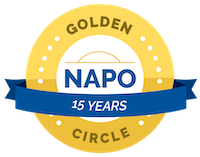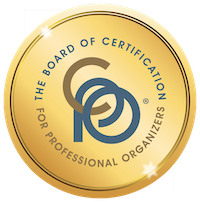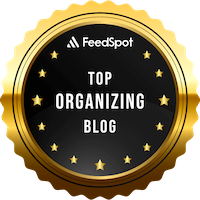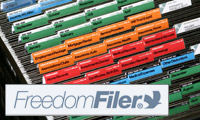Worth repeating (again): Trying out the KonMari method
Marie Kondo is back in the news after revealing that she’s less focused on keeping a perfectly tidy home now that she’s the mother of three small kids. I applaud that: our priorities (and organizing systems) change and it’s okay to say so. Since I was thinking about her, I thought I’d dust off this 2015 blog post about the time I tried out her method to declutter my clothes.
In a blog post earlier this week, I reviewed The Life-Changing Magic of Tidying Up: The Japanese Art of Decluttering and Organizing by Marie Kondo. In this short book—an international bestseller—the author details her KonMari method for decluttering and organizing.
As I wrote in my review there were aspects of the agreed with and aspects I didn’t agree with. But reading the book did make me want to give her methodology a try. The book does a great job of sparking action.
I decided to try out the KonMari method on my clothing. That’s the category that she recommends starting with because it tends to be the easiest category of items to part with. So, as instructed, I gathered up clothing from various storage areas in my house. I keep almost all my clothes in my bedroom, but there were some items in the guest bedroom closet, including out-of-season clothes and some that weren’t fitting when I moved them there.
I emptied all my drawers and shelves and piled everything on the bed. Marie would have had me pile everything on the floor. But in my bedroom, there’s more bed space than floor space. Plus, I didn’t have to bend over to reach the items on my bed. Here’s how my bed looked with all the clothes on it.

I started with the clothes from the guest room closet, because they were the ones I’d worn least recently (per Marie’s instructions). As I touched each item, I asked myself her trademark question, “Does this spark joy?”
I found the question to be very powerful. It’s different from, “How recently have I worn this?” or “Does this look good on me?” There were items in there I had once loved and probably still looked good on me, but they no longer sparked joy. They went right into the donate bag.
I used the app iDonatedIt to keep track of my donations as I put the items in the bag. It was very easy and gave me a little boost as I watched my tax deduction rise. Here’s a photo of the donations:

The whole process took me about 90 minutes (not counting the donation drop off) and when I was finished, I had donated more than half my clothes. What was left easily fit in the drawers and shelves in my bedroom (no more guest room closet for me!) with room to spare. There were items that had been stored in the guest room I’d completely forgotten about and some of them sparked joy. Now I have easy access to them.
I feel absolutely no pangs or worries that I’ll miss any of the items I donated. It’s clear that I still have an abundant amount of clothes. I love that they’re more mindfully stored now.
As an aside, I’ve been using Marie’s folding method for shirts for years. She suggested folding items so that they can be stored vertically, like files. I hadn’t used that method on pants, but today I tried it. So far, I like it quite a lot!
I know how to declutter, obviously. Did using the KonMari method make a difference? It did provide a couple of real advantages:
- The book (and my promise to blog about trying it out) got me to actually take a look at these clothes and bring them together in one spot.
- Working on all my clothes at the same time gave me a sense of completion.
- The question “Does it spark joy?” was very effective at getting me to let go of items without regret.
Of course, the book addresses more than clothing. A couple of days ago, the book inspired me to dispose of a bookshelf full of seminar notes—the handouts that used to be distributed at the conferences I attended (they’re now distributed electronically). That was a little harder; they represented more to me, I think. But I acknowledged that I literally had not looked at any of them after the conference and they were just taking up space. It felt really good to let those go and I have The Life Changing Magic of Tidying Up to thank for it.
I’m still not sure of the practicality of the book’s premise that one should always sort by category not by location—it’s great if you can do it in one session, but what happens if multiple sessions are necessary? it seems to me that you wouldn’t be able to find anything until the process is finished.
Maybe I’ll find out. There are still plenty of areas I can practice on in my own home. In any case, I think I’ll be using the “Does it spark joy?” question with at least some of my clients (giving Marie credit, of course). Perhaps I’ll post more here as I continue on this journey.
Getting back on track

I always love getting to work at the beginning of January. The year feels like a blank slate, my goals are set and I’m ready to establish new routines and take on new projects.
January 2023 started off well and then went off the rails. Mid-month I traveled to Walla Walla to settle my father’s estate and help my brother with some financial concerns stemming from his inheritance. That turned out to be about as fun as it sounds. I managed to pick up some sort of virus so didn’t feel or sleep well while I was there. By the time I flew home, I was feeling really lousy and my flight from Denver to St. Louis was plagued by mechanical difficulties. I finally walked in my door at 4 am.
I spent the rest of the week feeling physically and mentally exhausted. I did go to urgent care and I tested negative for COVID and the flu. I just had some sort of upper respiratory virus, I think.
Today is Monday and I feel human again. But I also feel like my glorious January, which started off so well, ended in a shambles.
But I’m ready to bounce back. Here’s how I think I’m going to approach it:
- Start right where I left off with yoga. I was enjoying Yoga with Adriene’s 30-day journey but my head got so stuffed up that the idea of doing a downward-facing dog felt like torture. The last day I was able to do yoga was Day 22. So today I’ll try Day 23 and I’ll keep going each day until Day 30. (Then I’ll figure out another 30-day journey to try.)
- Get right back to daily genealogy research. I have a 30 × 30 genealogy challenge going on at my genealogy blog, Organize Your Family History. I was going great guns with doing 30 minutes of daily research until I left for my trip. Then everything fell by the wayside. Instead of just calling it a bust, I’m going to try for daily research for the next 12 days, so I can reap the benefits of daily effort.
- Let my bullet journal be my guide. Yesterday, I combed through all 115 pages I’ve written in so far this year in my bullet journal and plucked out the outstanding tasks, many of which I’d forgotten about. (Thank you, brain fog.) I put them in a list that I will work from the rest of this week. I took note of the absolute must-dos. Having my tasks in one place should help keep me focused.
- Give myself grace. Guess what? There’s a wildcard this week that will have a great effect on my ability to feel back on track. It’s jury duty. I’ve never been selected for a jury and I don’t know what kind of time this year’s obligation will entail. But I’m going to cut myself a lot of slack. I’m going to try not to let having so much out of my control make me feel out of control. I’ll get the must-dos done and keep the other tasks close at hand for when I have snippets of time.
After feeling off the rails for a couple of weeks, I crave getting back on track. Getting back to daily routines and keeping a solid task list will be a huge help, I know. Wish me luck!
Photo by Lance Grandahl on Unsplash
My Word of the Year for 2023: SPACE

Ten years ago, I selected my first word of the year. In 2013, that word was Growth. (You can see a list of my words of the year over the last decade in this post from last year, What’s your Word of the Year?.)
This year, my word is Space. I wanted added space in my physical surroundings, my brain and my schedule. I think this will translate in to committing to less, buying less and letting go of more. It feels right for me this year.
For me, selecting a word of the year helps me, first of all, focus on my goals for the year and then it keeps me focused on them. It provides a sort of guiding star for the year. As I frequently do, I used Christine Kane’s Word-of-the-Year Discovery Tool to help me decide on a word. And this year I also used the 2023 Artist of Life Workbook from Lavendaire. It has a nice Word of the Year exercise.
I also like to come up with something to remind me of my Word of the Year. This year, I bought a Word of the Year mug from Susan Case Designs on Etsy. That’s a picture of it with this post. I love its simplicity.
Do you have a Word of the Year? If so, I’d love to hear what it is! Let me know in the comments.
Worth repeating: The freedom of Inbox Zero
After ten months of a non-empty email inbox, I finally achieved Inbox Zero last week and I’ve managed to clear my inbox every day since. (Because once you get there, it’s easy to clear it, as long as you remain committed.) It seemed like a good day to repeat this blog post I wrote more than five years ago about achieving and maintaining Inbox Zero.

I’ve posted here before about how I achieve Inbox Zero. For years, I had an Inbox Zero habit, so that at the end of the workday, there would be no emails in my inbox. I have to admit that this year I let it slide. In recent months, my goal was 20 emails in my inbox at the end of the day, rather than zero. That proved to be an unsatisfactory goal—it deprived me of the thrill of an empty inbox. Until recently.
Two weeks ago, I emptied my inbox. I made the decisions necessary to move or delete messages. I forwarded some emails to Evernote so I could create reminders and then archived the emails.
Almost without exception, at the end of each day since, I’ve had an empty inbox. (A couple of days I left one or two messages in there to act on in the morning.) This makes the beginning of the day so much easier, since most of the emails that come in before I get up are spam (many them in Italian, weirdly) or news sources I read with my coffee. It’s easy to delete the spam and read, then delete or archive, the news.
I’ve had people scoff when I mention Inbox Zero and how much I enjoy it. I’ve seen organizing experts I respect writing that it’s not an achievable or worthy goal. But I’m here to tell you, my life is so much easier when I maintain my Inbox Zero habit.
Here is why I love emptying my inbox at the end of the day:
- It forces me to make decisions about the emails I receive: I either respond, archive, delete, or file each one. (I file very few emails; I archive most of those I want to keep and find them with a search.)
- It prompts me to get rid of junk and unsubscribe from emails that don’t serve me.
- It means that nothing gets lost in my email inbox.
- It discourages procrastination—if I want to get the email out of my inbox, I need to act on it. So I’m a prompt responder to people who reach out to me. That’s good for business (and personal relationships).
- It gives me visual peace and a feeling of accomplishment. Every day.
The best part is that when I have only one day’s email accumulation, it takes me less than five minutes to empty my inbox on a typical day.
I encourage you to give it a try. If you have a lot of emails in your inbox, here are some ideas for getting down to zero without too much angst.
- Sort your emails by sender and delete or file as many as you can.
- If emails remain in your inbox because they require action, consider putting those actions on your task list, rather than using your inbox as a task list.
- Use the tools at your disposal, like flags in your email client, or forwarding emails to Evernote and set a reminder or try Boomerang, if you use gmail, to help you keep track of emails without having to keep them in your inbox.
- Act on emails as you read them, rather than letting them languish and clutter up your inbox.
- Make ample use of the Archive feature of your email client to get emails that you want to keep but don’t require a reply or action out of your inbox.
Trust me, dealing with email is easier with a streamlined inbox. Inbox Zero is not only achievable, it can be easy to maintain when you commit to it. I’m so glad I’m back on track with it.
Photo by Solen Feyissa on Unsplash
Creating a vision board
I love the concept of vision boards, where you create a physical or digital collage that represents your hopes and dreams. I’ve made them in the past (and blogged about using the Comic Lite program to create them ). But it’s been a good long while since I created a vision board.
But that changed this year! My podcast co-host, Shannon Wilkinson and I did an episode of our podcast, Getting to Good Enough, about creating vision boards (and letting go of perfectionism around doing it perfectly). Here’s the episode, if you want to give it a listen: Episode 230: Creating a Vision Board.
Last month, we hopped on Zoom and created our vision boards together, which was really fun. It took only an hour, thanks to this terrific video that I found on YouTube about using Canvas and Pinterest to make it to create a vision board.
Here’s the video:
A couple of my photos in my vision board came from Pinterest, but others came from my computer or phone. I really let the process be easy (yay!) and I’m thrilled with the result.
My vision board is on display as the wallpaper for my laptop. In my setup, my laptop is hooked up to a larger monitor at my desk, so the laptop screen is unused. That means the wallpaper is on full display and I’m looking at my vision board many times a day. I also printed out a small version, pasted it in my Bullet Journal and annotated it with explanations of what each of the elements represents.
In case you’re curious, here’s the result, as displayed on my computer.

If you have a little time, I encourage you to give it a try!
Don't miss the annual Elfa sale!

I love The Container Store’s Elfa system of closet solutions and drawers. I use lots of Elfa in my home and recommend to clients all the time. The extra-narrow cabinet-depth drawer drawer systems, for example, are game changers for under the bathroom sink! (That’s a picture of one with this post.)
If you’re interested in Elfa, now’s a great time to buy. Between now and February 12, all Elfa is 30 percent off.
I use Elfa in my own home, in a closet in my office and to store my yarn stash. I also use three different Elfa file carts in my office, one for my business archives, one for my genealogy papers and one for the files that I want close at hand. That one lives under my desk.
I’ve been using and recommending Elfa for fifteen years and the quality has remained consistent, I’m happy to say!
December 2022 tiny projects challenge: Day 5
I went to New York City early Friday morning for a fun weekend with my college besties, which is why I didn’t post my final tiny projects challenge post on Friday. But the trip itself inspired the tiny project, which I did after I got back. I decluttered my travel toiletries bag.
Like many people, I keep a bunch of travel-sized toiletries assembled so I don’t have to pack a lot of them when I travel. On travel day, I add a few things I use daily. Everything fits in my toiletries bag. But it’s all pretty much a jumbled mess.
So while I was unpacking last night, I decided to declutter my toiletries bag.
Here’s how it looked before I started:

I pulled everything out and gave it a quick sort on the dining room table:

There were many things I didn’t know were in there that I’m sure I put in thinking I’d feel like a genius if I needed them. But if I don’t even realize I have them, they’re not much help.
So I edited out a few items, like duplicate shampoos and creams, a sewing kit, and makeup remover, since I really don’t use makeup any more. I stashed my lipstick in my desk drawer. Then I put back the keepers and called it a day.
Here’s the after photo. (Total time: 10 minutes, tops.)

Everything will be much easier to access, which will be wonderful.
It got me thinking about the things that I add at the last minute to that bag when I travel. I think it might be worthwhile to buy an extra set of those things (toothpaste, deodorant, and vitamin C serum fall into that category), so I don’t have to do much of anything to pack. I use an electric toothbrush and I don’t want to invest in a duplicate, but I do keep a duplicate charger for the toothbrush in my suitcase. (I learned that the hard way.)
This is the end of my tiny projects series for this year. I’ll almost certainly do more next year. I love tackling these little decluttering and organizing projects!
Search
Recent Posts
- Budgeting and decluttering: It's all about priorities
- Today's truth bomb
- Worth repeating: Labels in the refrigerator
- The meat of my Bullet Journal
- Worth repeating (again): Getting past "I might need it some day"
- Furthering your goals one tiny step at a time
- Repeating spreads in my Bullet Journal
Tags
Links
- Shannon Wilkinson, life coach
- Getting to Good Enough podcast
- Institute for Challenging Disorganization
- NAPO St. Louis
- Organize Your Family History
- Peace of Mind Spending
- Ravelry
- Are you interested in becoming a professional organizer?
- National Association of Productivity and Organizing Professionals








